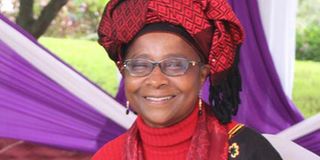How historical texts will help preserve Kenya’s history

Prof Micere Githae Mugo. PHOTO | FILE | NATION MEDIA GROUP
What you need to know:
- The demonstrators were fighting for multiparty democracy to be restored in the country.
- But that is the deepest the story goes, with minimal room for appeal to human emotions.
- In the school syllabus, for example, the struggle is given little emphasis and the freedom fighters accorded little or no credit at all.
On Sunday, July 7, patriots will mark 29 years since the Saba Saba morning. For starters, and for those of us who depend on facile truth of chronicled facts and dates to learn history, Saba Saba was a staged demonstration on July 7, 1990.
The demonstrators were fighting for multiparty democracy to be restored in the country.
As the story is told by mainstream historians, many people who posed a threat to the Kanu government of the day, were incarcerated and detained without trial, while others mysteriously disappeared, never to be heard of again.
EMOTIONS
But that is the deepest the story goes, with minimal room for appeal to human emotions. This means students of the recorded history fail to connect with the events, and the genuine reasons why Saba Saba was worth the sacrifice for the rebirth of a new Kenya.
To Saba Saba organisers and participants, it was an overwhelming moment to accentuate, reaffirm and restate their patriotism.
However, this is one of the many times patriotic Kenyans have had to don the revolutionary hats to change the course of the country. This struggle for a better Kenya started in the colonial days, long before what Jaramogi Oginga Odinga, in his autobiography Not Yet Uhuru, referred to as “Flag independence”. This was when Mau Mau freedom fighters and other formations went into the forest.
The history of the struggle for independence, which evidently continues to date, however, is hardly accurately depicted as a national fight that was worth the shedding of blood and spending time in the cold forests.
STRUGGLE
In the school syllabus, for example, the struggle is given little emphasis and the freedom fighters accorded little or no credit at all.
The danger with the lack of reverence to historical figures and events is that it leads to a waning of the spirit of patriotism and nationalism.
As true as the saying goes, whoever has no respect and memory for his past has no place in the future.
The past is taken to be a point of reference, to show how far we have come, the battles we have fought; won and lost, the rungs we have stepped up the ladder and, above all, the reason to jealously guarding our nationhood and sense of belonging.
I subscribe to the timeless yet politically suppressed notion that, for one to understand a country’s soul, they have to read its fiction.
This is primarily true because fiction, unlike mainstream chronicling of facts and time, is guided by creativity that cannot be gagged, controlled or distorted.
HISTORICAL INJUSTICES
In Kenya, for example, where people decry historical injustices, it has always been the ruling class dictating what should be taught in school; what they deem politically correct, regime-friendly and unthreatening. As a result, the true history ends up being concealed.
However, writers of repute have for long strived to record the events in history, accurately matching facts and emotions. At this point, it is safe to restate that writing as part of art plays a double purpose, of entertaining and educating.
To mean that good writing appeals to both emotions and reason. As such, the historical fictional texts sink readers into the past, when the events were happening in real time, and lets them judge their history.
This has not always gone well with the political elite, and many a writer have found themselves in trouble. For example, Ngugi wa Thiong’o and Micere Mugo wrote about the struggle of freedom by Mau Mau in the play The Trial of Dedan Kimathi.
FINAL STAGES
The play captures the scenes in the court, during the final stages of the struggle for independence, and answers the question of whether or not the freedom was worth fighting for. It also gives the reader an opportunity to understand why independence has remained an illusion over the years.
Similarly, Sam Kahiga, in his novel Dedan Kimathi: The Real Story, captures the historical battle for freedom in the forests. It impartially presents well-researched historical events that were happening during the dawn years of the struggle that was led by Dedan Kimathi.
Muchira Gachenge is the co-founder of Nairobi Literary Café. He blogs at muchirawrites.org




